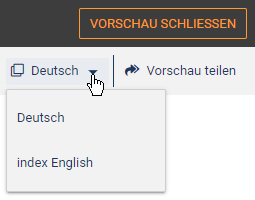Multilingualism and other languages
To offer a document in multiple languages, you must first activate the "dienst_sprachen" section parameter by entering the respective language abbreviations.
In our example, the pages are offered in German and English:
| Parameter | Value |
|---|---|
| dienst_sprachen | de,en |
Furthermore you have to set some category parameters, which point accordingly to the English version of the page:
| Parameter | Value |
|---|---|
| bereich_d_leitseite_uri | /ImperiaHandbuch/index.html |
| bereich_d_leitseite_uri_en | /ImperiaHandbuch/en/index.html |
| bereich_d_sitemap_uri | /ImperiaHandbuch/sitemap.html |
| bereich_d_sitemap_uri_en | /ImperiaHandbuch/en/sitemap.html |
| eingabe_dienst_sprachen_dokument | 1 |
If you set the parameter "eingabe_dienst_sprachen_dokument" to 1, you will get the possibility to select different languages for each document in the meta step.
In principle, a counterpart in another language can be added to each parameter that refers to a document or a web page.
Edit multilingual documents
After setting the parameters, you can create the documents as usual.
For all set languages you can enter a title and, if necessary, a navigation entry in the meta step, for example when creating a document.
All languages selected there get their own editor window in the edit step.

If you have entered the text in German and English for a created document in both editor windows, you can switch between the different languages in the preview window.
When publishing, Imperia automatically creates two web pages from this document, whose URIs differ only by the inserted "/en".
You can also customize the navigation as usual via Imperia or directly via the QuickEdit bar.
Here you can find a list of all languages available so far:
- German (de)
- English (en)
- French (fr)
- Dutch (nl)
- Polish (pl)
- Portuguese (pt)
- Spanish (es)
- Arabic (ar)
- Chinese (zh)
- Russian (ru)
- Japanese (ja)
- Turkish (tr)
- Ukrainian (uk)
If another language is to be provided there, please contact CIT. Note that for additional languages, appropriate translators must be provided.
Special case of multilingualism
In a multilingual website, sometimes not every page should be written in all languages. However, readers should be referred to a "central" page in another language on the monolingual pages. I.e. also on these monolingual sides all flag symbols are to be indicated, which are linked if necessary with the respective central side of the appropriate language.
For this purpose, in addition to the "document-specific" multilingualism (i.e. if the category parameter "dienst_sprachen" is activated), the category parameter "dienst_sprache_uri_xx" can also be set to the URL of the "central" other-language page. Here, "xx" must be replaced by the respective language abbreviation (e.g. "en" for English or "zh" for Chinese). In addition, the category parameter "eingabe_dienst_sprachen_dokument" must be set to "1".
If the other language page is then deselected in the meta step, i.e. the deselected language is not recorded for this document, then the finished web page still receives a "flag" link that refers to the "central" language page specified under "dienst_sprache_uri_xx".
For example, if the URL http://www.uni-muenster.de/ImperiaHandbuch/en/index.html is to be used as the "central" English-language page in a German/English-language website, the following rubric parameters must be set:
- dienst_sprachen=de,en
- eingabe_dienst_sprachen_dokument=1
- dienst_sprache_uri_en=http://www.uni-muenster.de/ImperiaHandbuch/en/index.html
If the English version is not checked in the meta step, the web page generated towards it will have an English flag with a link to http://www.uni-muenster.de/ImperiaHandbuch/en/index.html.
